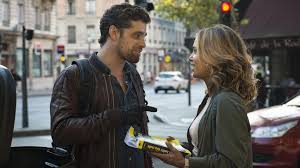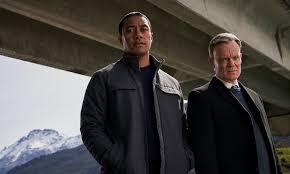Swedish science-fiction movies is not exactly a populous genre so it is interesting to get to see a space film made by people from this part of the world. As you would expect, there are fewer explosions and lightworks and it is pretty heavy on existential philosophy but not overly dialoguey which is a plus.
The Aniara is a massive spaceship, like several cruise liners out together that is transporting people from Earth, which seems to be largely uninhabitable thanks to climate change, to a new home on Mars. Except that an accident after leaving the Earth means that they are fated to probably never get there. The film consists therefore of the story of life on board this spaceship as they try to adapt to this new reality which the captain at first avoids admitting. We know about it because the main character MR (Emelie Garbers)
is a staff member; she runs a space where people can relax in and through some combination of holograms and hacking into their brains, they can recreate in sleep memories of nature on Earth which calms them in their predicament.
The trouble is that Mima, itself, the machine/space is not immune to the huge demand on her and also ends up burning out. MR shares a cabin with a cynical astronomer who knows exactly what is going on and is played with gusto by Anneli Martini.
She eventually starts a relationship with one of the officers in charge of navigation, Isagel (Bianca Cruzeiro) and they start raising a child together. Food as we know it runs out, replaced by algae, cults form, people commit suicide and the vessel silently sails on in space with only one encounter in 24 years with another “body”. It’s fairly bleak stuff.
The positive side of the movie is the way different people react and how the film reflects a little bit what life is like on our planet and how we have not been prepared for the responsibility of making meaning of our lives in the universe and how to best handle this.
Considering the budget is probably not enormous, the directors create a convincing atmosphere. What let the film down a bit was the petering out of the story especially in the last third. The film is actually based on a poem and maybe the last part follows this and a certain narrative coherence but, on the other hand, the entertainment value diminishes. Secondly, the lack of absolutely any help or contact with Earth or any other spaceship seems rather unlikely in this day and age of multiple satellites and space junk.
And given such a good premise, maybe a little bit more of the frictions among the staff could have added something.
A novel and creative work that does well but fails to completely capture your interest.

3 stars plus































































































